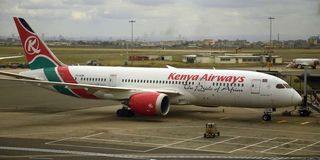Kenya Airways, staff row to be settled out of court

A Kenya Airways plane. The national carrier staff row will be settled out of court. File | Nation Media Group
What you need to know:
According to Justice Hellen Wasilwa, the objective of the conciliation is also to prevent massive job losses.
An employment dispute between aviation workers and Kenya Airways on reduction of staff, salary cuts and unpaid leave due to Covid-19 pandemic will be resolved through conciliation.
In a ruling made by the Labour Court, the move is aimed to keep the struggling national carrier, which posted a Sh14 billion loss in the first half of 2020, afloat and save it from incurring further huge financial losses. According to Justice Hellen Wasilwa, the objective of the conciliation is also to prevent massive job losses.
The ruling is among the emerging cautionary decisions being made by the Labour court when determining employment disputes during the pandemic to balance workers’ rights against the harsh economic situation facing their employers.
Justice Wasilwa, while ruling on a petition filed by the Kenya Aviation Workers Union (Kawu) challenging the intention of the loss-making airline to lay off employees, said it is common knowledge that the impact of Covid-19 on the aviation industry has been grave. “This is a matter, which is obvious,” the judge said.
Breached the law
“However, that does not mean there will be derogation from the well-known principle of negotiations and consultations between union and management before implementing certain decisions, which can have far-reaching consequences on the employer and the employees,” she said.
The judge found the national carrier had breached the law and the Constitution by failing to consult the union before implementing decisions on reduction of staff, cutting salaries by 30 per cent and directing some employees to proceed for unpaid leaves.
“The decisions made by KQ indeed impacted on remuneration of the union members and their livelihood and it should, therefore, be handled with caution,” Ms Wasilwa said.
However, she declined to grant a request by the union to declare that the decisions of the airline were discriminatory, illegal and amounted to unfair labour practice. She noted that there had been some discussions between the two parties, but the negotiations had not been concluded.
“Given the nature of this petition and the need to balance between industry in these difficult times due to the negative impact on the airline by Covid-19 and the need to keep KQ afloat in the circumstances in order to save massive job losses, I find that the best remedy is to have the parties go back to the conciliation process in order to reach the best decision,” Justice Wasilwa said.
She directed the parties to submit to the negotiation process within the next 30 days and resolve the issues.
The union sued following a general notice by KQ managing director to all employees that the company anticipated resumption of domestic flight operations, but with depressed demand.
The July 3 notice directed all staff not required to support the reduced operations to proceed on unpaid leave.
Support core operations
Union secretary-general Moss Ndiema said that on July 7, KQ’s chief Human Resource Officer issued an undated directive purporting to implement the managing director’s notice.
Other notices clarified that all employees not required to support core operations would proceed on unpaid leave without any benefits.
Those that were to be left at work were to be put on salary pay-cuts of 30 per cent without any provision for compensation of the remainder of 70 per cent salary upon resumption of normal operations.
“The directives were not only given without prior notice, discussions or concurrence of the union, but also implemented without seeking voluntary, free and fair concurrence of the employees,” said Mr Ndiema.
He told the court that after the business in the aviation industry got paralysed worldwide by the Covid-19 pandemic, the union and the airline executed a Memorandum of Agreement dated April 2 and May 27.
Allowing pay cuts
The agreement altered the terms of service of employees by allowing pay cuts and unpaid leave in April provided that the said deductions would be compensated upon resumption of normal business. The agreement would also apply for May and June and would be varied or extended by both parties.
However, upon lapsing on June 30, the agreement was never extended. Therefore, the terms of the Collective Bargaining Agreement dated December 19, 2014 in respect of remuneration, leave and other terms would apply.
But the airline’s Chief Executive Human Resource Officer Evelyne Munyoki in defending the company’s decisions said since the onset of the pandemic, operations have drastically reduced.
She further said the revenues that would cater for the airline’s operation costs such as staff remuneration, had significantly declined to a position that it cannot cater for these costs.
“The effects of the pandemic have exacerbated the losses that the respondent incurs on a weekly basis to the tune of $7.4 million (approximately Sh800 million),” Ms Munyoki said.


